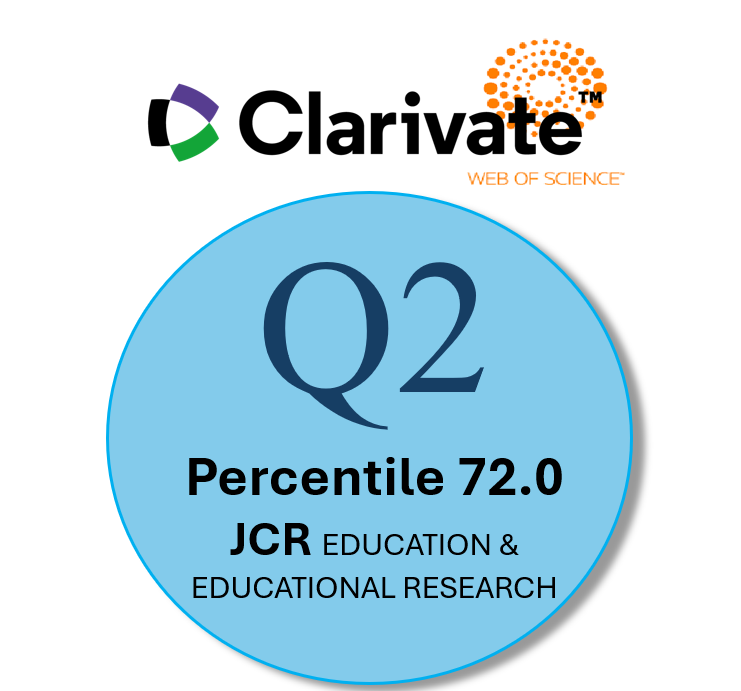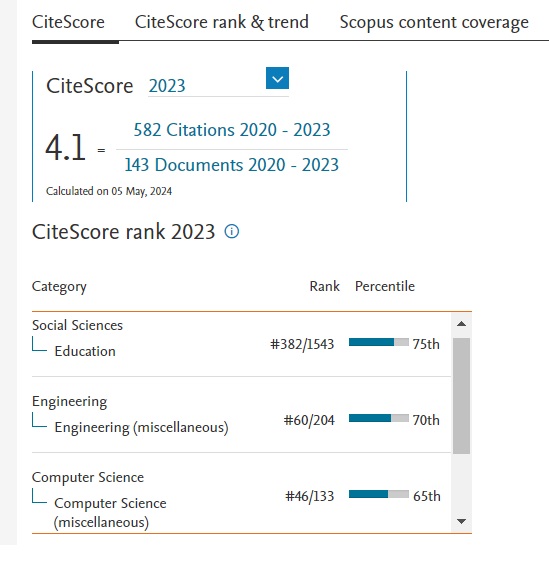Habilidades metacognitivas y emociones en la construcción de los Entornos Personales de Aprendizaje
Agencias de apoyo
- Entornos Personales de Aprendizaje, Aprendizaje Autorregulado, emociones, Educación Superior
Resumen
Los procesos metacognitivos durante el aprendizaje están ligados a diferentes aspectos como las emociones y la motivación, que a su vez contribuyen al desempeño de los estudiantes. En este trabajo de investigación se identificó el papel de las emociones en la experiencia de aprendizaje durante el desempeño del alumnado en modalidad en línea de Educación Superior durante la construcción de sus Entornos Personales de Aprendizaje (PLE por sus siglas en Inglés) en México. El estudio se realizó a través de una investigación mixta en la que se aplicó el cuestionario CAPPLE y entrevistas semiestructuradas. Los resultados muestran que las emociones relacionadas con la felicidad y la sorpresa motivan a los estudiantes a desarrollar su PLE, mientras que emociones como el miedo o la tristeza motivan a los estudiantes a desarrollar habilidades y destrezas metacognitivas. Además, se identificó que existe una correlación entre algunos procesos metacognitivos para la planificación del aprendizaje y emociones al momento de utilizar herramientas digitales. Las conclusiones reflexionan sobre la necesidad de apoyar tanto los procesos metacognitivos como los emocionales para el éxito del aprendizaje en línea y la construcción del PLE.
Descargas
-
Resumen1681
-
PDF 596
Citas
Anwar, K. & Wardhono, A. (2019). Students’ perception of learning experience and achievement motivation: prototyping English for Academic Purposes (EAP). International Journal of Instruction, 12(3), 271-288. https://doi.org/10.29333/iji.2019.12317a
Anggun, B., Santoso, H. B., & Junus, K. (2022). Personal learning environment toward lifelong learning: an ontology-driven conceptual model. Interactive Learning Environments. https://doi.org/10.1080/10494820.2022.2039947
Archundia, E., Cerón, c., Rossainz, M., Beltrán, B. y Garcés, A. (2021). Análisis de los datos del Entorno Personal de Aprendizaje (PLE): caso de estudio gestión del proceso de aprendizaje ante la contingencia COVID-19. Tecnología Educativa revista CONAIC, 8(1), 81-90.
Camacho- Zuñiga, C., Pego, L. Escamilla, J., & Hosseini, S (2020). The impacto f the COVID-19 pandemic on tudents’ feelings at high school, undergraduate, and postgraduate levels. Heliyon, 7(3). https://doi.org/10.1016/j.heliyon.2021.e06465
Castañeda, L., & Adell, J. (2013). La anatomía de los PLEs. En L. Castañeda & J. Adell (Eds.), Entornos Personales de Aprendizaje: Claves para el ecosistema educativo en red (pp. 11-27). Alcoy: Marfil. Recuperado de: http://digitum.um.es/xmlui/bitstream/10201/30408/1/capitulo1.pdf
Castañeda, L., & Tur, G. (2020). Resources and Opportunities for Agency in PLE Related Pedagogical Designs: a Literature Exploration. IxD&A, (45), 50-68.
Casquero, O., Romo, J., Benito, M., Ovelar, R. (2013). Participation and interaction in learning Environments: a whole-network analysis. In M. Thomas (Ed.), Technologies, innovation, and change in personal and virtual learning environments. Hershey, PA: IGI Global, 111–131. DOI: 10.4018/978-1-4666-8847-6.ch006
Cheremnykh, A. N. (2022). Digital educational resources and a solution to the problem of blended learning in the academic disciplines “physical culture”. Pedagogical Review, 1(41), 70-76. https://doi.org/10.23951/2307-6127-2022-1-70-76
Chhetri, K. (2020). The benefits of using rubrics to assess students work. Rig Tshoel: Research Journal of the Royal Thimphu College, 3(1), 21-26.
Cho, H.J., Melloch, M.R. & Levesque-Bristol, C. (2021). Enhanced student perceptions of learning and performance using concept-point-recovery teaching sessions: a mixed-method approach. IJ STEM Ed 8, 32. https://doi.org/10.1186/s40594-021-00276-1
Cohen, L., Manion, L., & Marrion, K. (2018). Research methods in education. (7th ed.). Routledge.
Dabbagh, N., & Castaneda, L. (2020). The PLE as a framework for developing agency in lifelong learning. Educational Technology Research and Development, 68(6), 3041–3055. https://doi.org/10.1007/s11423-020-09831-z
Dabbagh, N., & Kitsantas, A. (2012). Personal learning environments, social media, and self-regulated learning: A natural formula for connecting formal and informal learning. Internet and Higher Education, 15(1), 3–8. https://doi.org/10.1016/j.iheduc.2011.06.002
Dewey, J. (1938). Experience and education. New York: Macmillan.
Dittman, J., Suh, D., Lavingia, K. S. & Amendola, M. F. (2020). Mind over matter: self-perception of skills has an impact on career aspirations and learning in a vacular simulation workshop. Journal of vascular surgery, 72(1). https://doi.org/10.1016/j.jvs.2020.04.105
Fiedler, S. H., & Väljataga, T. (2011). Personal learning environments: Concept or technology? International Journal of Virtual and Personal Learning Environments, 2(4), 1–11. https://doi.org/10.4018/jvple.2011100101
Fiedler, S. H., Väljataga, T. (2013). Personal learning environments: Concept or technology? In M. Thomas (Ed.), Technologies, innovation, and change in personal and virtual learning environments. Hershey, PA: IGI Global, 166–176. https://doi.fgorg/10.4018/978-1-4666-2467-2.ch014
Fraile, J., Panadero, E., & Pardo, R. (2017). Co-coreating rubrics: the effects on self-regulated learning, self-efficacy and performance of publishing assessment criteria with students. Studies in Educational Evaluation, 53, 69-76. https://doi.org/10.1016/j.edurev.2017.08.004
Gallardo, K., & Rivera, N. (2020). Evaluating virtual reality as a learning resource: an insight into user experience, usability and learning experience. In A. Mikroyannidis; M. Chang & S. White (eds.), Proceedings of the 12th International Conference on Mobile, Hybrid, and On-line Learning (eLmL 2020), (pp.67-71).
Gutierrez, I., Prendes, M. P., & Sánchez, M. M. (2016). Análisis del PLE de Estudiantes Universitarios Españoles: Proyecto CAPPLE. Congreso In-Red. http://dx.doi.org/10.4995/INRED2016.2016.4388
Hariyanto, D., Arafat, Y., & Wardiah, D. (2021). The effect of Facilities and motivation on learning outcomes of High Scholl Students in Gelumbang, Indonesia. Journal of Social Work and Science Education, 2(1), https://doi.org/10.52690/jswse.v2i1.210
Kim, C., Park, S. W., & Cozart, J. (2013). Affective and motivational factors of online math learning. British Journal of Educational Technology. http://dx.doi.org/10.1111/ j.1467-8535.2012.01382.x.
Kim, C., Pekrun, R. (2014). Emotions and Motivation in Learning and Performance. In: Spector, J., Merrill, M., Elen, J., Bishop, M. (eds) Handbook of Research on Educational Communications and Technology. Springer, New York, NY. https://doi.org/10.1007/978-1-4614-3185-5_6
Kolb, D.A (1984). Experiential learning: experience as the source of learning and development. Englewood Cliffs: Prentice Hall.
Kop, R. y Fournier, H. (2013). Developing a framework for research on personal learning environments. eLearning Papers, 35.
Larrosa, Jorge. (2006). Sobre la experiencia. Aloma: revista de sicología, ciències de l’educació i de l’esport Blanquerna, (19), 87-112.
Lee, D., Arthur, I. T. and Morrone, A. S. (2015) Using video surveillance footage to support validity of self-reported classroom data. International Journal of Research and Method in Education. DOI: 10.1080/1743727X.2015.1075496.
Lewin, K. (1946) Action research and minority problems. Journal of Social (2, 4), 34–46.https://doi.org/10.1111/j.1540-4560.1946.tb02295.x
Marín Juarros, V., Salinas Ibáñez, J., & de Benito Crosetti, B. (2014). Research results of two personal learning environments experiments in a higher education institution. Interactive Learning Environments, 22(2), 205–220. https://doi.org/10.1080/10494820.2013.788031
Mega, C., Ronconi, L., & De Beni, R. (2014). What makes a good student? How emotions, self-regulated learning, and motivation contribute to academic achievement. Journal of Educational Psychology, 106(1), 121–131. https://doi.org/10.1037/a0033546
Mendoza-Franco, G., Dorador-González, J.M., Díaz-Pérez, P., Zarco-Hernández, R. (2021). Design of Learning Digital Tools Through a User Experience Design Methodology. In: Bhatia, S.K., Tiwari, S., Ruidan, S., Trivedi, M.C., Mishra, K.K. (eds) Advances in Computer, Communication and Computational Sciences. Advances in Intelligent Systems and Computing, (1158). Springer, Singapore. https://doi.org/10.1007/978-981-15-4409-5_67
Nota, L., Soresi, A., & Zimmerman, B. J. (2004). Self-regulation and academic achievement and resilience: A longitudinal study. International Journal of Edcuation Research, 41(3), 198-215. https://doi.org/10.1016/j.ijer.2005.07.001
Nganji, J. T. (2018). Towards learner-constructed e-learning environments for effective personal learning experiences. Behaviour & Information Technology, 37(7), 647–657. https://doi.org/10.1080/0144929X.2018.1470673
Nasir, N., Mustafa, S., Sulvianti, S., & Azizah, N. (2021). The effecto of locus of control on learning achievement during the Covid-19 Pandemic. Indonesian research journal in education, 5(2). https://doi.org/10.22437/irje.v5i2.15252
Ning, H. K. & Downing, K. (2012). Influence of students learning experience on academic performance the mediator and moderator effects of self-regulation and motivation. British Educational Research Journal, 38(2), 219-237. http://dx.doi.org/10.1080/01411926.2010.538468
Trujullo, B. f. (2014). Experiencia y educación. Revista Mexicana de Investigación Educativa, 19(62), 885-892
Panadero, E. (2017). A review of self-regulated learning: Six models and four directions for research. Frontiers in Psychology, 8(422). https://doi.org/10.3389/fpsyg.2017.00422.
Pekrun, R., Elliot, A. J., & Maier, M. A. (2006). Achievement goals and discrete achievement emotions: A theoretical model and prospective test. Journal of Educational Psychology, 98(3), 583–397.
Pedro, L. & Santos, C. (2021). Has Covid-19 emergency instruction killed the PLE? In Ninth International Conference on Technological Ecosystems for Enhancing Multiculturality (TEEM’21) (pp. 518-j521). Barcelona, Spain. ACM. https://doi.org/10.1145/3486011.3486508
Prendes, P., Castañeda, L., Gutierrez, I., & Sánchez, M.M. (2017). Personal learning environments in future professionals: nor natives or residents, just survivor. Internacional Journal of Information and Edcuation Technology, 7(3). 10.18178/ijiet.2017.7.3.861
Prendes, M.P., Román, M., y González, V, (2018). How University Students Use Technologies to Learn: A Survey about PLE in Spain. Ediciones Universidad de Salamanca (20). https://doi.org/10.14201/eks2019_20_a10
Prendes-Espinosa, M. P., Castañeda-Quintero, L., Solano-Fernández, I. M. Roig-Vila, R., Aguiar-Perera, Mª V, & Serrano-Sánchez, J. L. (2016). Validación de un cuestionario sobre hábitos de trabajo y aprendizaje para futuros profesionales: explorar los Entornos Personales de Aprendizaje. RELIEVE, 22(2), Article 6. http://dx.doi.org/10.7203/relieve.22.2.7228
Ramírez Mera, U. N. y Barragán López, J. F. (2018). Autopercepción de estudiantes universitarios sobre el uso de tecnologías digitales para el aprendizaje. Revista Apertura, 10(2), 94-109. http://dx.doi.org/10.18381/Ap.v10n2.1401
Ramírez, U., Tur, G., & Marín, V. I. (2022). Personal Learning Environments in Online and Face-to-Face Contexts in Mexican Higher Education. Open Education Studies, 4(1), 148-160. https://doi.org/10.1515/edu-2022-0009
Ramírez, U., & Tur, G. (2021). Supporting Students’ Control and Ownership of Learning in the Multimodal Learning from a PLE Perspective. In Ninth International Conference on Technological Ecosystems for Enhancing Multiculturality (TEEM’21) (pp. 495-500). Barcelona, Spain. ACM. https://doi.org/10.1145/3486011.3486502
Shaikh, Z. A.; Khoja, S. A. (2012). Role of Teacher in Personal Learning Environments. Digital Education Review, (21), 23-32. https://raco.cat/index.php/DER/article/view/254209 [Consulta: 31-05-2022].
Shaikh, Z. A., & Khoja, S. A. (2014). Personal learning environments and university teacher roles explored using Delphi. Australasian Journal of Educational Technology, 30(2). https://doi.org/10.14742/ajet.324
Serrano, J. L., Carrera, X., Brescó, E., Suárez, C. (2019). Tratamiento crítico de la información de estudiantes universitarios desde los entornos personales de aprendizaje. Educação e Pesquisa (45), 1-21. https://doi.org/10.1590/s1678-4634201945193355
Yen, C.-J., Tu, C.-H., Sujo-Montes, L., Harati, H., & Rodas, C. R., (2019). Using personal learning environments (PLE) management to support digital lifelong learning. International Journal of Online Pedagogy and Course Design, 9(3), 13-31. DOI: 10.4018/IJOPCD.2019070102
Zimmerman, B. J. (2002). Becoming a self-regulated learner: An overview. Theory Into Practice, 41(2), 64-70. http://dx.doi.org/10.1207/s15430421tip4102_2
Derechos de autor 2023 Revista de Educación a Distancia (RED)

Esta obra está bajo una licencia internacional Creative Commons Atribución-NoComercial 4.0.
Las obras que se publican en esta revista están sujetas a los siguientes términos:
1. El Servicio de Publicaciones de la Universidad de Murcia (la editorial) conserva los derechos patrimoniales (copyright) de las obras publicadas, y favorece y permite la reutilización de las mismas bajo la licencia de uso indicada en el punto 2.
2. Las obras se publican en la edición electrónica de la revista bajo una licencia Creative Commons Reconocimiento-NoComercial-SinObraDerivada 3.0 España (texto legal). Se pueden copiar, usar, difundir, transmitir y exponer públicamente, siempre que: i) se cite la autoría y la fuente original de su publicación (revista, editorial y URL de la obra); ii) no se usen para fines comerciales; iii) se mencione la existencia y especificaciones de esta licencia de uso.
3. Condiciones de auto-archivo. Se permite y se anima a los autores a difundir electrónicamente las versiones pre-print (versión antes de ser evaluada) y/o post-print (versión evaluada y aceptada para su publicación) de sus obras antes de su publicación, ya que favorece su circulación y difusión más temprana y con ello un posible aumento en su citación y alcance entre la comunidad académica. Color RoMEO: verde.














